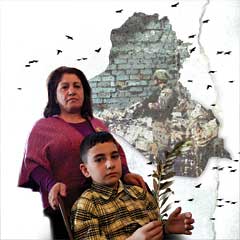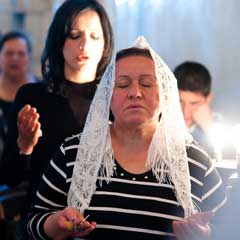The fact that Brigadier-General David Menard, the Commander of Canadian forces in Afghanistan, called for an inquiry into his own conduct — specifically into the circumstances in which his rifle discharged at the Kandahar airbase last March 25 — will hardly inspire confidence in the troops under his command and among the Afghan civilians they are defending.
Canada might be new to modern warfare, our generals might be rusty on how to load a rifle, but we yield to none in knowing about inquiries. Indeed, conducting inquiries seems to be the only Canadian growth industry immune to the vicissitudes of the economic cycle.
Canada might be new to modern warfare, our generals might be rusty on how to load a rifle, but we yield to none in knowing about inquiries. Indeed, conducting inquiries seems to be the only Canadian growth industry immune to the vicissitudes of the economic cycle.
For most Canadians, I suspect, the alleged activities of the Michigan-based Hutaree militia amount to little more than fresh evidence of the occasional craziness we’ve come to expect from Canada’s neighbour to the south.
Canadians should not be so smug.
Canadians should not be so smug.
 Proposed changes to Ontario’s sex-education curriculum were ill conceived and ineptly delivered. Premier Dalton McGuinty’s only good move on this file was his hasty flip-flop on a plan to muscle explicit sex instruction into elementary schools this fall.
Proposed changes to Ontario’s sex-education curriculum were ill conceived and ineptly delivered. Premier Dalton McGuinty’s only good move on this file was his hasty flip-flop on a plan to muscle explicit sex instruction into elementary schools this fall.Contrary to some interpretations, the sex-ed initiative was not derailed by Catholics. The government had no intention of imposing a curriculum on Catholic schools that conflicted with Church teaching on sexuality. McGuinty wasn’t about to risk a court challenge by requiring Catholic teachers to teach sexual orientation to Grade 3 students. Instead, Catholic educators had a government blessing to integrate the proposed new curriculum into the Fully Alive program, which has been delivering elementary students faith-based lessons on sexuality, marriage and family for more than 20 years.
 Catholics are angry about recent revelations of clerical sexual abuse for two reasons: crimes were committed against children by men ordained as priests and, in many cases over many years, bishops refused to protect children from known predators by removing abuser priests from ministry and calling in the police
Catholics are angry about recent revelations of clerical sexual abuse for two reasons: crimes were committed against children by men ordained as priests and, in many cases over many years, bishops refused to protect children from known predators by removing abuser priests from ministry and calling in the policeThe Vatican apparently understands why sexual abuse of children ignites such intense anger. But it seemingly struggles to comprehend why Catholics are so angry about crimes committed and covered up 20, 30 years ago. In recent years, after all, under then Cardinal Joseph Ratzinger and now Pope Benedict XVI, the Church has enacted tougher protocols to empower bishops and involve police when crimes are suspected. Yet anger persists.
 Forced to flee from Iraq, a refugee recounted to Catholic Register editor Jim O’Leary the story of his family’s flight to Syria and start of new life in a Toronto suburb. Along with his wife, two daughters and mother-in-law, he arrived in 2009 after being sponsored by a Toronto-area parish. To protect his children’s privacy, he requested his name be withheld.
Forced to flee from Iraq, a refugee recounted to Catholic Register editor Jim O’Leary the story of his family’s flight to Syria and start of new life in a Toronto suburb. Along with his wife, two daughters and mother-in-law, he arrived in 2009 after being sponsored by a Toronto-area parish. To protect his children’s privacy, he requested his name be withheld.Our family is blessed to be in Canada. We have received wonderful support and we hope some day we can pay everyone back.
In Baghdad, our situation became dangerous when the American war started in 2003. There were tanks in the streets and bombs and fighting.
 Fawaz Fatohi received an envelope at his home containing a knife and an anonymous letter: “If you don’t leave Iraq, you will be killed.”
Fawaz Fatohi received an envelope at his home containing a knife and an anonymous letter: “If you don’t leave Iraq, you will be killed.”
Fatohi is an Iraqi Christian. He was raising a young family in Baghdad when the death threat arrived. Soon thereafter he was among an estimated half-million Iraqi Christians who had fled for their lives. He eventually found refuge in Canada, leaving behind his forsaken brothers in Syria, Jordan and Lebanon.
 A generation ago Canadians opened their doors to more than 100,000 Vietnamese refugees. Today, thousands of Iraqi refugees need our help. And although many of them are Christian, that’s not the reason to get involved. As someone said, we’re not doing this because they’re Christian, we’re doing it because we are.
A generation ago Canadians opened their doors to more than 100,000 Vietnamese refugees. Today, thousands of Iraqi refugees need our help. And although many of them are Christian, that’s not the reason to get involved. As someone said, we’re not doing this because they’re Christian, we’re doing it because we are.The April 18, 2010 edition of The Register contains a 12-page section that details the desperate plight of almost two million Iraqi refugees. More than 250,000 of them are Christians being persecuted solely because of their faith. We encourage you to read our special report and consider the hardship of people who have been forced to flee their homes after once-peaceful neighbourhoods became places of threats, assaults, kidnapping and murder.
Some allegations have staying power no matter how often they are refuted. For the past month, articles and broadcasts have abounded with reports about the sexual-abuse scandal and claims of cover-up at the highest levels of the Church. Most allegations concerned events in Europe and the United States, and spread wildly after suggestions that even Pope Benedict XVI may have known of or approved a decision to return a German priest offender to ministry.
Led by The New York Times, there were efforts to implicate the Pope — in his former capacity as a cardinal and head of the Congregation for the Doctrine of the Faith — with failing to act promptly in a U.S. case. The allegations and The Times’ role in spreading them have been widely and justifiably refuted and discredited, including by The Times itself, albeit with less prominence than it gave the original report.
Led by The New York Times, there were efforts to implicate the Pope — in his former capacity as a cardinal and head of the Congregation for the Doctrine of the Faith — with failing to act promptly in a U.S. case. The allegations and The Times’ role in spreading them have been widely and justifiably refuted and discredited, including by The Times itself, albeit with less prominence than it gave the original report.
The rage that has greeted recent allegations of sex-abuse cover-ups and foot-dragging by the Catholic hierarchy comes, at least in part, from genuine compassion for the victims. This righteous anger, expressed in countless newspaper columns and blogs (Christian and secular) over the last few weeks, is something Catholics at every level of the Church should take seriously. Because it comes from a good place — outrage on behalf of the wounded and defiled — it can be a healing wrath and welcome judgment, summoning all Catholics, not just the clergy and hierarchy, to repentance and spiritual revival.
But another kind of anger, arising from a dark, hate-filled place in modern culture, has been evident as well. It’s not the whole story, but it’s an important aspect of what’s unfolding in the present moment’s sound and fury. I am speaking of the vengeful drive by some commentators to bring down the Catholic Church completely — the visible institution, of course, but also its mission of announcing the Kingdom of God.
But another kind of anger, arising from a dark, hate-filled place in modern culture, has been evident as well. It’s not the whole story, but it’s an important aspect of what’s unfolding in the present moment’s sound and fury. I am speaking of the vengeful drive by some commentators to bring down the Catholic Church completely — the visible institution, of course, but also its mission of announcing the Kingdom of God.
Put the blame where it really belongs - on the abuser
By Dorothy Pilarski, Catholic Register Special
I got a call one day from a good friend who was disturbed by how some of her family and friends might respond to a television program. I did not see the program, but it was about the sex scandal in the Catholic Church.
Here’s how I respond to well meaning friends, family and associates who try to enlighten me about the problems in the Church.
Here’s how I respond to well meaning friends, family and associates who try to enlighten me about the problems in the Church.
As the international Jewish community united in protest against a perceived slight spoken in a Good Friday homily by a Vatican official, I wondered why Catholics continue to remain silent amid the suffering of our brothers and sisters in faith in the Holy Land.
This silence has been particularly baffling in the years since the erection of the towering walls that surround some Palestinian cities of the West Bank. Movement from one Palestinian city to the next — and into Jerusalem itself — is prohibited for most Palestinian Catholics. Even those few granted travel or work visas from Israel are subjected to excessive scrutiny. These restrictions prevent Catholics from worshipping in the holy sites of Jerusalem. Seminarians located in Bethlehem are unable to acquire visas to pray in Jerusalem even though it is just a 15-minute drive away.
This silence has been particularly baffling in the years since the erection of the towering walls that surround some Palestinian cities of the West Bank. Movement from one Palestinian city to the next — and into Jerusalem itself — is prohibited for most Palestinian Catholics. Even those few granted travel or work visas from Israel are subjected to excessive scrutiny. These restrictions prevent Catholics from worshipping in the holy sites of Jerusalem. Seminarians located in Bethlehem are unable to acquire visas to pray in Jerusalem even though it is just a 15-minute drive away.

